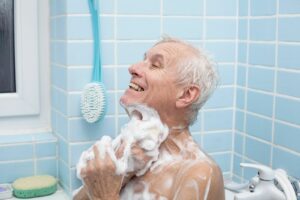How Personal Care Aides Can Help Prevent Infections In Seniors
Seniors who are aging in place have a high risk of developing infections like UTIs and skin infections. As seniors get older their skin changes, and if they are not properly caring for their skin, seniors increase the risk of developing infections. Germs and bacteria can get into small scrapes or scratches in the skin and cause infections. Personal care at home providers are very helpful in reducing the number of infections that seniors get.

Personal Care at Home Essex County NJ – How Personal Care Aides Can Help Prevent Infections In Seniors
Seniors also have a high risk of developing urinary tract infections as they get older. If your senior parent struggles with incontinence they may have frequent UTIs. When seniors have UTIs they can suffer from a range of symptoms including confusion and dizziness, which can increase the risk of falls.
If your senior parent has trouble taking showers, washing their hands, or getting to the bathroom that can increase the risk that they will develop skin infections or UTIs. Personal care at home helps seniors maintain good skin health and hygiene to prevent infection.
Some of the ways that personal care at home can help seniors avoid infection are:
Regular Showers And Baths
Regular bathing or showering with gentle antibacterial soap is essential for seniors. It keeps the skin clean and reduces the chances of bacterial growth that can lead to skin infections. Regular showers also give a personal care at home provider the chance to inspect your senior parent’s feet and skin for any cuts or scrapes that could become infected.
Moisturizing
Aging skin tends to become drier, which can make it more susceptible to cracking and breaking, creating entry points for bacteria. Applying moisturizers designed for the needs of senior skin helps to keep the skin hydrated and intact, reducing the risk of skin infections. Often seniors have trouble bending and reaching all the areas that need moisturizing, like their feet, elbows, and backs. Having a personal care at home provider there who can make sure seniors are keeping their skin moisturized can prevent infections.
Incontinence Care
Seniors who experience incontinence are at higher risk of UTIs due to prolonged exposure of the genital area to moisture and bacteria from urine. Proper management of incontinence, including regular changing of absorbent products and briefs and helping seniors clean up after using the bathroom can prevent UTIs.
Regular Toileting
Seniors may not always know when they need to relieve themselves, especially as they get older. A personal care at home provider can remind seniors to use the bathroom on a regular schedule, and help them when they need it, which can lower the risk of UTIs.
Paying Attention To Symptoms Of Infection
Regular observation of the skin for any signs of irritation, redness, or infection can facilitate early detection and prompt treatment of skin issues before they escalate. Similarly, monitoring for symptoms of UTIs such as frequent urination, burning sensation, or cloudy urine allows for timely intervention with medical treatment.
Getting Treatment When Necessary
If a caregiver notices symptoms of infection or a potential problem like an open sore they can work with your senior parent’s doctor to make sure that your senior parent gets the medical treatment or antibiotics they need to treat skin infections or UTIs.
Source: https://www.dispatchhealth.com/blog/most-common-skin-infections-in-seniors/
If you or an aging loved one are considering hiring professional Personal Care at Home Services in Essex County NJ, please talk to the caring staff at Generations Home Health Care today.
Providing Home Care in Somerset, Essex, Union, Morris, and Hunterdon Counties. Call us today at (908) 290-0691 or (973) 241-4534.
- Tips for Helping Seniors with Alzheimer’s Get Dressed - July 17, 2024
- How Home Health Care Can Help with Mobility for Seniors - July 8, 2024
- Things Your Dad Needs When He Comes Home From A Hospital Stay - June 20, 2024


